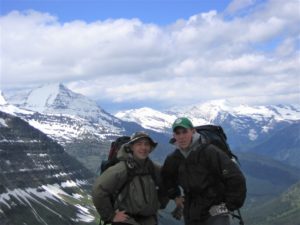
Climbing a mountain is something I have done frequently in my life. Now, I don’t climb well and I certainly don’t climb fast, but the view from the top of a mountain is a thing of awesome wonder. Most of the mountains I manage to climb are little ones, 2,000 to 3,000 feet gain in elevation. My knees are happiest when I stick to 1,000 feet gain in a climb.
But climbing a mountain isn’t just something we do in a literal sense. We tackle mountains every day of our lives. It might be a chronic illness or a to-do list that looks like it will never get to-done. Some of our mountains are emotional or spiritual as we struggle for balance or faith. The things I have learned from my struggles to climb real mountains also apply to climbing these metaphorical mountains.
First, break a mountain climb into stages. When I look at any mountain climb, I try to divide it into doable parts. I tell myself all I have to do is get to that overlook or this waterfall. Then I can decide about climbing the rest of the mountain. If you have a mountain of work to do or an emotional barrier to overcome, break it into smaller pieces. Don’t look at the 50 million things you have to do. Start with a small task that is easily finished. Or work on the most important one for a while. Getting started can be the hardest thing about being a mountain climber.
Second, take each stage one step at a time. If I think about the 5,000 steps I have to take – all uphill – I can be defeated before I start. But if I concentrate on one step at a time, the 5,000 steps can all get done. Take one step – then the next one – and then the next. Don’t be overwhelmed by the size of the task. Baby steps are perfectly acceptable. It’s your climb – go at your own speed.
 Third, stop to rest when you need to. One of the reasons I take lots of pictures is so that I can use it as an excuse to rest. “*Pant*pant*pant* I just want to get a shot of the lichen on the other side of this tree. *Pant*pant*pant*.” Enjoy the view from wherever you are. Take time to savor all the steps that led you to this point. Acknowledge that climbing is not your superpower and you need to take some time. Catch your breath. And then get going again.
Third, stop to rest when you need to. One of the reasons I take lots of pictures is so that I can use it as an excuse to rest. “*Pant*pant*pant* I just want to get a shot of the lichen on the other side of this tree. *Pant*pant*pant*.” Enjoy the view from wherever you are. Take time to savor all the steps that led you to this point. Acknowledge that climbing is not your superpower and you need to take some time. Catch your breath. And then get going again.
Finally, take someone with you on your climb. One of our hangups in life is thinking that we have to do it without help. We think that asking for help will make us look stupid or incompetent. Nonsense! I have great respect for people who ask for help. If nothing else, having a companion on the journey makes it more enjoyable. Tom has helped me over lots of boulders and up many steep paths.
The companion we should all have with us on every mountain climb is Jesus. He can help us over the rough spots. He rejoices when we ask for his help. Jesus never abandons us, no matter how difficult the climb.
Climbing a mountain is something we do over and over in our lives. We need to remember to take our time and bring along our mountain-climbing Companion.
